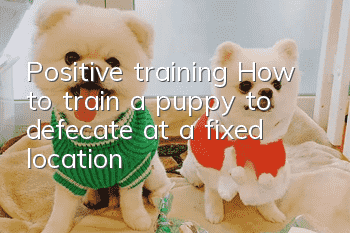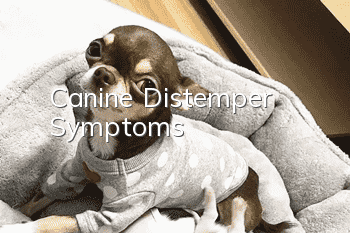Positive training: How to train a puppy to defecate at a fixed location

A very common method is to put some inducers or some of its urine on the dog toilet or newspaper to guide the puppy to defecate in the dog toilet or newspaper. According to current and very accurate statistics, only 3 out of 10 dogs can defecate in this way.
The remaining 7 dogs simply cannot associate your behavior with their defecation behavior. So the most important thing about training a dog is how to tell it in a way that it can understand.
Because animals are kind and direct, any way they know how to do will get rewards, they are willing to learn. This is also discussed in the previous article. The theory of positive training (Portal: Dogs 99% of the problems are actually your problem), today I will tell you the methodology for training puppies to defecate at fixed points.
Preparation before training:
When a dog just arrives home, he will be at a loss in a strange environment. He will try to defecate everywhere in the house in order to find a safe place for defecation. Therefore, you should pay more attention to the dog's behavior when he first arrives home. Once you find that your dog has the intention to defecate, take it to a prepared location in time, such as the bathroom, balcony or outdoors, which will make fixed-point defecation training easier.
When you start training, be prepared to be patient and don't worry about setbacks. As long as you persist in training and reward your puppy from the first time he obeys your instructions and goes out to defecate obediently with you, he will understand what you mean and learn more skills. This is also positive training.
The best time to start training your puppy:
Experts recommend starting home training when your puppy is 12 to 16 weeks old. From that time on, he had some bladder and bowel control and was able to learn to control it better.
If your puppy is over 12 weeks old when you bring him home, and he already has experience being in a crate (and possibly eating his poop), then home training may take longer. You must reshape the dog's behavior through encouragement and rewards.
Belty training: delineating the range of activities
Experts recommend confining puppies to a fixed space, whether in a carton, in a room, or in a fenced-in space. When your puppy performs a correct defecation behavior, you can reward it by giving it more range of motion and extra food to make it understand that this is a correct behavior.
If your puppy defecates indiscriminately, you should not punish it through corporal punishment, because that will be almost useless except to make your puppy fear you. You just needClean up the feces, then stop providing extra food and narrow its range of activities to let it understand that its behavior is wrong. After several matches, the puppy can slowly learn the correct defecation behavior.
Notes on delineating the scope of activities:
Establishing a territory is a good way to train your puppy, at least in the short term. This way you can monitor him, direct what he should do and teach him how to do it, until you open the crate and let him out.
1. Make sure it is big enough for the puppy to stand up, turn around, and lie down, but not so big that it can use any corner as a toilet.
2. Make sure there is food and drinking water within the activity area.
3. If you can't be home during training, make sure someone can take him out for the first 8 months.
Develop good daily habits:
1. Let the puppy have a regular eating plan and take away the food between meals.
2. Take your dog out for a walk every morning and evening, and then every 30 minutes to an hour. Also, be sure to take your dog out after meals or when he wakes up from his nap.
3. Make sure the dog has completed its defecation before going to bed at night to help it develop the habit of not defecating at night.
4. The size of the dog can be a factor in evaluating whether to take it out to defecate. For example, smaller breeds have smaller bladders and higher metabolisms, requiring more frequent outings.
5. Every time you take your puppy to the same place to defecate, the smell it leaves will also help it develop a habit.
6. When your puppy poops outside, praise him or give him a reward. A walk in the neighborhood is a nice bonus.
These behaviors indicate that your puppy needs to go outside to relieve himself:
Whining, circling, sniffing here and there, barking, or if your dog is free, barking or scratching at the door, are all signs that he needs to go. Please take him out immediately, he may need to defecate.
What to do if you encounter setbacks during training:
Failure is common in puppies under one year old, and the reasons for failure range from incomplete home training to changes in the puppy's environment. When your puppy fails in training, you must first persist in continuing to train it. If it still doesn’t work, you can consult your veterinarian to rule out whether it is a health problem with your dog.
A few tips on training a puppy:
1. Punishing your puppy because he made a mistake is absolutely not allowed., punishment teaches your puppy to be afraid of you.
2. If you find hidden feces but don’t see any defecation behavior, don’t yell angrily or let it smell. It is not intellectually possible for a puppy to connect your anger to something they did wrong.
3. Even if you catch it defecating randomly, you should deal with it calmly, otherwise the memory of being punished during defecation will make it refuse to defecate in front of you.
4. Spending more time outdoors with your puppy may help reduce its messy defecation, it may just need more time to explore.
5. Use enzymatic cleaners instead of ammonia-based cleaners to clean up stools to reduce odors that may attract your puppy back to the same spot to continue defecating there.
Positive training is a method and a concept. It conveys that we choose to bring dogs into our society and let them learn various behaviors so that they can live better with us. If we can't let them connect every bit of the world with good things, then if we keep them in captivity around us, they will feel that there is still a trace of happiness. Otherwise, we can't do it.
- What to do if a puppy bites a chicken
- What are the treatments for Shiba Inu vomiting?
- How old can a dog take a bath?
- Be alert! List of dog food taboos!
- Canine Impetigo Causes | Diagnosis | Prevention and Treatment Methods
- How much does a black Labrador retriever cost? Black Labrador retriever price!
- Things to note when raising a Pomeranian
- Several causes of dog hair loss and solutions!
- What should I do if my dog vomits and won’t eat?
- Why does a dog vomit out dog food but it is still intact?



